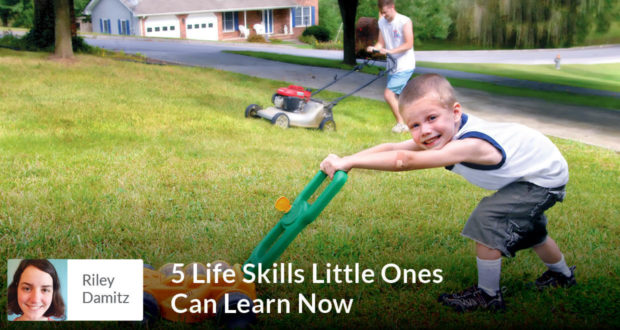Summary
Riley Damitz explores 5 ways to help children learn life skills, grow in responsibility and learn to appreciate family values by helping around the house.In recent years, I’ve heard many complaints about the entitlement of this generation. People are more ungrateful and lazy than ever before. How can you prevent your kids from falling into this culture trap?
In this age of technological pampering, provide opportunities for even your youngest children to grow in responsibility by assigning them standard chores.
It is through learning these basic housekeeping skills that children learn important life skills and build a strong work ethic, leading them to lives of greater fulfillment.
Enlisting your kids’ help allows them to take ownership of their lives, mature in their abilities, and learn to appreciate family values.
1. Let your kids help with cooking by teaching them to bake or cook a specific dish.
Most children eight and older are quite capable in the kitchen!
Do your kids help set the table and load the dishwasher? If so, you’re off to a good start. Many children are ready to take the next step in helping with meal preparation. Knives and peelers should be reserved for mom and dad, but careful supervision suffices for grating vegetables or using the stove.
Try starting with something simple, like breakfast food. My little siblings love making scrambled eggs, a very simple yet satisfying meal that saves mom some time in the morning. Show your kids how to crack an egg gently and scoop out any stray bits of shell.
Demonstrate how to season their meal with a little salt and pepper, as well as how to prevent over-seasoning.
Review safe cooking practices: keeping hands away from hot burners, never leaving the room while frying something, using clean hands and utensils.
While the food may not come out perfectly the first time (or the second!), it is important to give your children a safe space to experiment and gain experience with this important aspect of a healthy life.
What other lost skill did children learn back in the good old days? Keep reading to find out!
2. Sewing: a timeless skill that is regretfully neglected today.
Everyone should know how to sew on a stray button or stitch up an injured teddy bear!
In the Little House on the Prairie series, it seems like those girls were always sewing something! Knowing how to use a few simple stitches can be a great money saver and also the beginning of a fun hobby.
To get your kids started, round up a few needles and a spool of thread. It can be difficult for children to get the thread through the eye of a needle, so try a large embroidery needle and practice knotting the ends a couple of times before beginning a project.
Get started on something simple: hemming blankets for dolls, making little pillows out of fun fabrics, re-attaching an animal’s lost eye.
For fixing articles of clothing or stuffed animals, work on ensuring even placement of equal-sized stitches. When sewing on buttons, reinforce the need for tight – but not thread snapping – stitches.
Sewing is ideal for working on hand-eye coordination and has very concrete results for your children to show off!
3. Lawn work: start them picking up sticks or pulling weeds – a great way to teach our stewardship of the world.
While husbands may wish the seven-year-old could take over mowing the lawn, it may be difficult to find a lawn mower his size! Dad can still get some time off, though, if the kids help out in a few other ways.
My little siblings, being closer to the ground than the rest of us, are handy for picking up sticks before the lawn mower comes through. Challenge your kids to pick up a certain amount of sticks within a set time limit.
In my experience, the sibling rivalry usually encourages over-achieving in the scramble to get the most sticks to show mom. Don’t be afraid to assign more outdoorsy tasks as well – this can be an excellent way to burn off all that extra energy!
Whether digging holes for new bulbs or picking weeds in an assigned section of the garden, kids can learn to appreciate the gift of nature and gain a strong work ethic. While the kids can help dad in this way, how can they help mom?
4. Babysitting: if there’s a job only mom can do, be sure that older siblings can take over holding, rocking, and entertaining baby.
Even four-years-olds can usually keep the little one smiling for a few minutes!
While mom should keep a closer eye on infants, one, two, and three-year-olds can often get along well with an older sibling. As you feed the baby, demonstrate how to catch dribbles with a spoon or hold a bottle correctly. When carrying the baby, point out the right way to support baby’s head and how to rock him or her gently.
Older siblings learn quickly from such narration and can replicate mom’s actions fairly easily. Cultivate safe habits around the littlest member of the family, directing kids to keep their hands gentle when playing.
Charge a sibling to sit with baby for a short amount of time while you make lunch or throw in a load of laundry. Gradually increase responsibility by enlisting help with feeding and changing as well.
These valuable skills will enable your children to interact well with other babies and small children and free up your hands for a bit!
5. Housekeeping – many hands make light work!
Assign each child a specific room to tidy and/or vacuum – you’d be surprised at how much they can do!
At my house, each child is assigned a room to clean every Friday. Each room comes with its own responsibilities, making some more suitable for smaller children than others.
For example, an older child can take care of the classroom, putting away books and straightening chairs before vacuuming, while a younger child can help in the playroom by picking up all the toys.
This method of organization leaves no corner undusted and gives each child a chance to shine – literally or figuratively! In this same vein, reinforce periodical bedroom cleaning as well. Make sure the kids are accountable for making beds, putting away laundry, and tidying up toys or projects.
These five simple steps create a more welcoming and organized home, while teaching kids the skills they need to be good homemakers as adults.

 Seton Magazine Catholic Homeschool Articles, Advice & Resources
Seton Magazine Catholic Homeschool Articles, Advice & Resources

